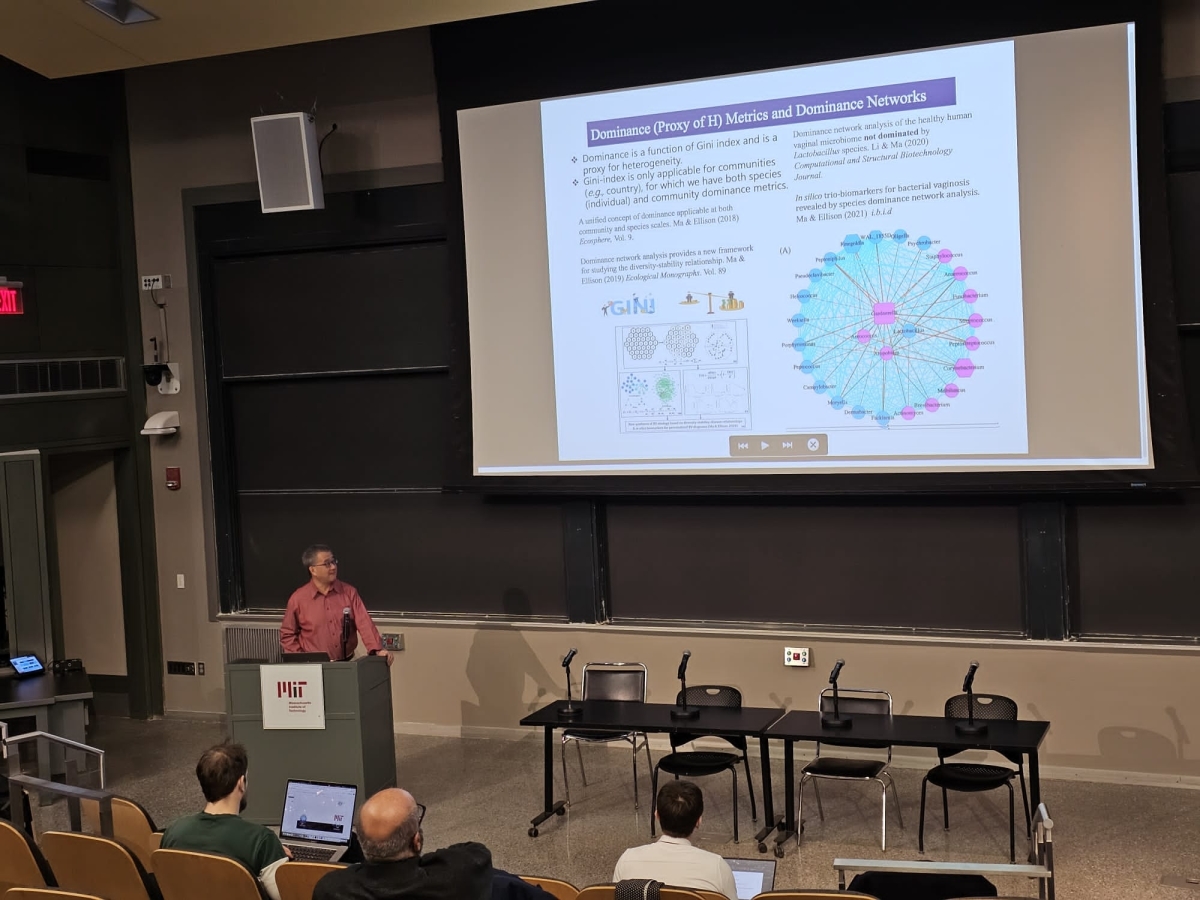You are here
Heterogeneity research can be critical for bridging the gap between AI innovations and biomedicine
On January 19th, Dr. Zhanshan (Sam) Ma, Harvard Forest Bullard Fellow and Dr. Aaron M. Ellison, Senior Research Fellow (Emeritus) in Ecology of Harvard University were invited to present their collaborative research work during the 2024 Harvard-MIT Symposium on “The revolutionary impact and emerging challenges of generative AI in STEM research and education.” Their presentation was titled “Heterogeneity research can be critical for bridging the gap between AI innovations and biomedicine” (https://indico.mit.edu/event/887/contributions/2768/). In addition, Dr. Ma was invited to join in the panel discussion session of the conference.
 In the talk, they showcased how heterogeneity-inspired medical ecology analysis and AI technology have enabled them to propose and test novel hypotheses about human diseases, including proposing and verifying a new hypothesis about bacterial vaginosis (BV) etiology (including diversity-stability relationships), which offers credible evidence to challenge the traditional narrative about this important disease that influences as many as one-third of reproductive-aged women. Their presentation also mentioned innovative results concerning two other important human-microbiome associated diseases that are important for the health of women and children: the etiology of mastitis and risk of autism spectrum disorder (ASD).
In the talk, they showcased how heterogeneity-inspired medical ecology analysis and AI technology have enabled them to propose and test novel hypotheses about human diseases, including proposing and verifying a new hypothesis about bacterial vaginosis (BV) etiology (including diversity-stability relationships), which offers credible evidence to challenge the traditional narrative about this important disease that influences as many as one-third of reproductive-aged women. Their presentation also mentioned innovative results concerning two other important human-microbiome associated diseases that are important for the health of women and children: the etiology of mastitis and risk of autism spectrum disorder (ASD).
The primary messages from their presentation were:
- Heterogeneity is an essential concept for noticing differences and is fundamental for building our most basic categories, social systems, models, and their causal explanations.
- Heterogeneity is also a reality in the dynamics of natural and anthropogenic systems, including forests, BV, banking, computer chips, and software.
- Harnessing heterogeneity is of critical importance for human endeavors, including bridging innovations in AI and biomedicine.
- The interactions between heterogeneity and AI can be bidirectional: Heterogeneity can be sources of inspirations for computation, while we can use AI effectively to study and deal with heterogeneity.
Examples of the last message, which was particularly relevant for the symposium are:
- Heterogeneity inspires better chip design and manufacture—the so-termed Composite Cores: “Pushing heterogeneity into a core” and Heterogeneous integration in the AI era
- Heterogeneity inspirations for evolutionary computing—chaotic and stochastic populations in genetic algorithms (see more)
- Heterogeneity inspirations for deep learning—neural heterogeneity promotes robust learning
- Harnessing the research on heterogeneity for human health—quantification of tumor heterogeneity: from data acquisition to metric generation
- Taming heterogeneity for public health policy-making—masking behavior & anti-pandemic policy-making with evolutionary game theory modeling (see more)

